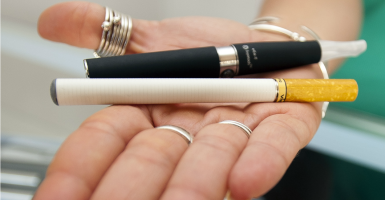Many innovative products that may help people quit smoking, such as e-cigarettes, may be forced off the market, courtesy of a looming Food and Drug Administration (FDA) rule.
The FDA’s new rule would require companies—if they can—to show that their e-cigarettes are “substantially equivalent” to a tobacco product that was on the market as of February 15, 2007.
E-cigarettes though, in general, didn’t exist on this 2007 date. Therefore, a company introducing a new e-cigarette product couldn’t use this substantial equivalent standard because there was nothing that was substantially equivalent.
Instead, these companies would have to go through the costly and burdensome pre-market tobacco application process. For smaller companies, and maybe even larger companies, the process may be infeasible. Making matters worse, this premarket tobacco application process would apply to existing e-cigarette and vaping products on the market, not just future products.
The market has shown what can happen when companies are able to innovate and develop solutions to move people away from smoking.
As a result, the federal government would be blocking many products from being sold that could help people stop smoking. Regardless of whether this absurdity is due to a technical flaw in the Tobacco Control Act (passed in 2009, giving the FDA power to regulate tobacco) or an overaggressive FDA, this regulatory scheme will likely hurt public health and needs to be addressed.
The market has shown what can happen when companies are able to innovate and develop solutions to move people away from smoking. The federal government has shown what it can do to stop that progress.
There’s a simple and practical solution. The “FDA Deeming Authority Clarification Act of 2015” would change the 2007 date, changing the “grandfather date” to the effective date of the FDA’s upcoming regulations. This would allow these innovative vapor products to utilize the far more reasonable substantial equivalent standard because substantially equivalent products do currently exist.
On Tuesday, April 19, 2016, the House Appropriations Committee is expected to consider H.R. 2058 as an amendment to the agriculture appropriations bill.
This legislation would be a good step forward. Looking further down the line though, there will be continued innovations that may not be able to meet the substantially equivalent standard, even with a 2016 date, because there may not be something substantially equivalent on the market. Congress needs to ensure that public health solutions are not hampered because of poorly considered regulatory schemes and artificial timelines.




























